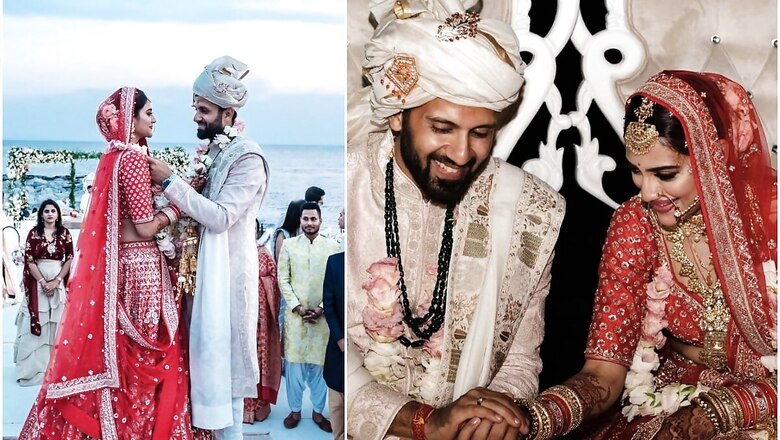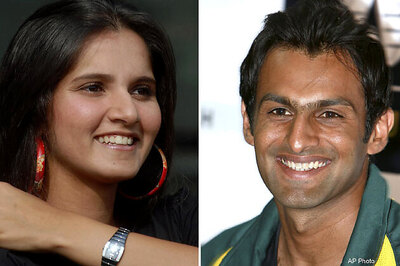
views
Marriage is as much a societal concept as it is a legal one. Trinamool Congress MP and actor Nusrat Jahan’s statement that her “marriage” with Nikhil Jain in Turkey was not registered in India and, therefore, not “valid” raises several important questions of law. Her claim that they have separated and the relationship can be best described as “a live-in relationship” also presents unique challenges before the Indian legal system. Jain’s annulment petition before the Alipore Judges’ Court further adds to the complexities.
A Matter of Two Faiths
Nusrat Jahan in a statement made on social media has claimed that her marriage with Nikhil Jain required registration in India as per the Special Marriage Act, given that both followed different faiths. Nusrat during and after her marriage in Turkey had started wearing sindoor, mehendi, and other articles, which have been traditionally associated with a Hindu wife. Inter-faith marriages are indeed registered under the Special Marriage Act in India. Marriages outside India, even if on a ship, need to be registered under the Foreign Marriage Act, 1969.
Recognition of Foreign Marriage in India
Indian law recognises the validity of foreign marriages in India. At least one of the parties should be an Indian citizen. The law provides different ways for such marriages to be conducted. They can either be conducted in the Consulate, or at a private ceremony and later registered as a marriage by the Marriage Officer deputed in the Indian Consulate. Section 14 of the Foreign Marriage Act, 1969, provides for a certificate of registration. Importantly, it is the Special Marriage Act that governs the aspect of matrimonial relief, i.e. annulment, divorce, judicial separation, for marriages registered under the Foreign Marriage Act. As Nusrat’s “marriage” was not registered, it seems that the provisions of the Special Marriage Act will not apply.
Legal Procedure for Divorce in Turkey
Marriage is considered a contract under Islamic law, which can be enforced as per the law of the land where the two parties entered into the contract. People interested in getting married in Turkey need to show documents of their nationality. If the “marriage” of Nusrat Jahan and Nikhil Jain was conducted in Turkey in accordance with Turkish law, then they may have to resort to Turkish law to get a divorce.
Is Adultery a Crime?
Nikhil Jain in his statement has said that he has had no relation with Nusrat since November 2020. It is also being rumoured that Nusrat is in a relationship with BJP leader Yash Dasgupta. Adultery was considered a serious crime under Section 497 of the Indian Penal Code, 1860. The Supreme Court in 2018 decriminalised adultery as it violated several fundamental rights. Therefore, even if the marriage between Nusrat and Nikhil is legal, a criminal case for adultery cannot be made. However, adultery continues to remain a ground for divorce.
Dispute over Property
Nusrat has alleged that Nikhil has taken her money along with several valuables and is not returning them. Traditionally, the wife has rights over ‘Stree Dhan’, which is gifts received during the marriage. A number of cases are filed every year, both in civil and criminal courts, to enforce these rights. With Nusrat claiming that there was no marriage, she would not have any ‘Stree Dhan’ rights or any claim over her husband’s property. She will have to claim relief under separate criminal laws. Filing criminal cases is usually a strategy to bring the other side to the negotiating table, and this could be the case here as well.
Live-in Relationships
Nusrat and Nikhil dated for a few years before getting married in Turkey. There is no precise definition of a live-in relationship and this term is a creation of judicial pronouncements. The 21st century society is at odds with 19th century laws. There is an ongoing debate over raising the minimum age of marriage, which is presently 21 years for men and and 18 years for women. Courts have started directing police to give protection to couples in live-in relationships. The Madras High Court is considering whether a woman in a live-in relationship can have a right to pensionary benefits of her partner.
Today, a person can become a single parent without getting married. Cases under the Domestic Violence Act can be filed in a live-in relationship. Marriage is considered an eternal bond in India, lasting a lifetime, but this idea has been challenged by the youth. A married couple has to necessarily resort to courts to get a divorce, but no such conditions apply in a live-in relationship. The popularity of live-in relationship has grown simultaneously with an increase in disposable income.
The Supreme Court decriminalised homosexuality in 2018, but legislative changes in the Indian Penal Code have not been made. The gap between traditional laws and a modern society is widening, giving rise to concepts that are not yet recognised in “law”. The country is witnessing a debate on Uniform Civil Code for several decades, but no credible action has been taken. After Nusrat’s case, the government should take a lead and codify the law on subjects like live-in relationships.
Breach of Parliamentary Privilege
Nusrat Jahan while taking oath included the word Jain in her name. Her Lok Sabha profile shows her marital status, with Nikhil Jain named as spouse. So, how can Nusrat now claim that there was no marriage? And if her statement is true, has she then not given a false statement before Parliament? Had she made any such false declaration in her affidavit to the Election Commission, her Lok Sabha seat could have been impacted. However, in this case, as per Nusrat’s own admission that she is not married, breach of privilege proceedings may be initiated against her in Parliament.
Earlier, Subramanian Swamy had complained to the Speaker about Sonia Gandhi’s educational qualifications, which were apparently false. Later, Sonia Gandhi had called it a typographical mistake and withdrawn such qualifications, and the matter was put to rest. Nusrat will be protected from any cases concerning her conduct, inside Parliament. However, she can undoubtedly face criminal cases, including cheating, criminal breach of trust, outraging religious feelings, defamation etc., filed by Nikhil Jain and others for her conduct outside Parliament.
Nevertheless, it will be interesting to see if a breach of privilege motion is initiated, and what conclusions arise from the same. And, Nusrat Jahan has to handle the matter as an MP, not as an actor.
Read all the Latest News, Breaking News and Coronavirus News here.



















Comments
0 comment